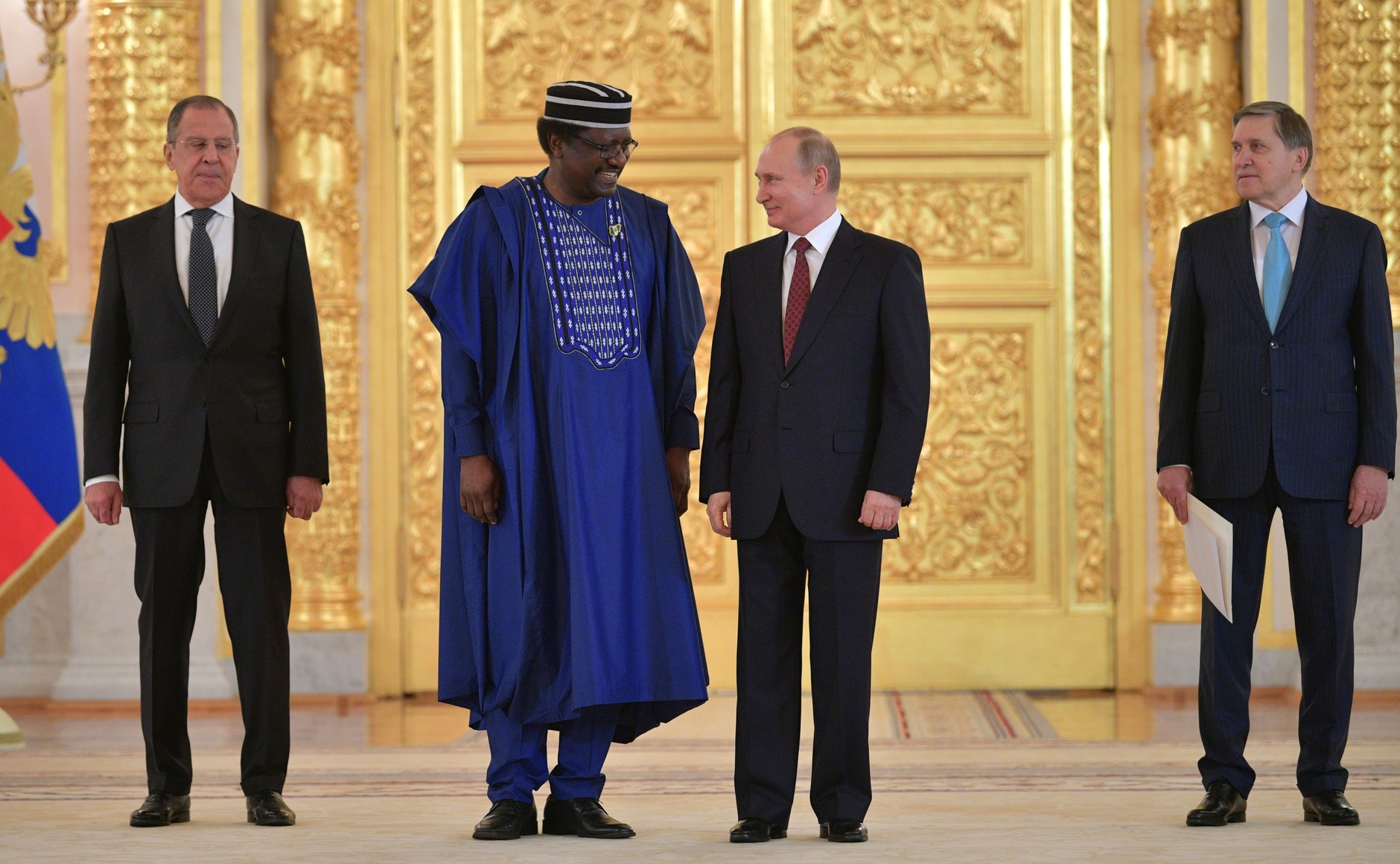World
Reasons Why Russians Seek Media Presence in Africa

By Kester Kenn Klomegah
Acknowledging undoubtedly that Africa has become a new world center for global development, Russian legislators at the State Duma (the lower chamber) have advocated for a greater media representation to facilitate collecting important information to support business and economic cooperation with Africa.
Reason One: Viacheslav Volodin, the chairman of the State Duma, told an instant meeting held, with participation of African diplomats, to brainstorm for fresh views on the current Russia-African relations: “it is necessary to take certain steps together for the Russian media to work on the African continent.”
“You know that the Russian media provide broadcasting in various languages, they work in many countries, although it is certainly impossible to compare this presence with presence of the media of the United States, United Kingdom and Germany,” he said as the ambassadors responded with a big applause.
Sharing additional matured sentiments and decisiveness about the media, Volodin added: “We propose to move from intentions to concrete steps. Our people will better understand each other through parliamentary relations.”
For the past few years, Russia has made some efforts returning with investment and business to Africa, but unfortunately, not all these steps have received adequate publicity. The presence of Russian media on the African continent and that of African media in the Russian Federation have been raised several times in the past by many policy experts.
Reason Two: Vladimir Shubin, deputy director of the Institute for African Studies in Moscow said that Africa has great potential for bilateral relationships with Russia and, most importantly, Russia’s contribution is very noticeable in dealing with the problems of Africa.
Perhaps, one of the reasons why some African leaders have written off Russia is the lack of information about Russia or rather plenty of distorted information they have received from the Western media coverage of Russia. In fact, Russia needs genuine and objective information about modern Africa, and here both state and private mass media linger a lot, according to Shubin.
Reason Three: Olga Kulkova, a research fellow at the Center for Russian-African Relations at the Institute for African Studies, said that “Africa needs broader coverage in Russian media. Leading Russian media agencies should release more topical news items and analytical quality articles about the continent. Russia has to adequately collaborate with African partners and attract Russian business to Africa. More quality information about modern Russia should be broadcast in African states.”
“Indisputably, it takes a lot of money and efforts, but the result will pay off. Russia ought to take the media into account if it wants to improve the chances for success in Africa. All the leading countries have been doing that quite efficiently for a long time,” Kulkova noted.
Reason Four: While many experts argue that African media seem uninterested in developing working links to Russia, Vasily Pushkov, an independent expert on international media relations wrote in an emailed comment that “it works both ways and the two regions are very far from each other.” They (Russia and Africa) are not as interconnected as they were during the Soviet era, he stressed.
Pushkov explained that “Russia might have an image problem among African political and business elites, partly due to the fact that Russia has low presence in Africa compared to the Soviet era. Most African media get their global news from the leading Western media outlets, which in turn have a nasty and longstanding habit of always portraying Russia as the world’s bogeyman.”
Reason Five: “Russian media write very little about Africa, what is going on there, what are the social and political dynamics in different parts of the continent. Media and NGOs should make big efforts to increase level of mutual knowledge, which can stimulate interest for each other and lead to increased economic interaction as well,” said Fyodor Lukyanov, editor-in-chief of the journal Russia in Global Affairs.
“To certain extent,” Lukyanov said, “the intensification of non-political contacts may contribute to increased interest. Soft power has never been on a strong side of Russian policy in post-Soviet era.”
Reason Six: The trend may change for the better. In a foreign policy speech, President Vladimir Putin urged all his Russian ambassadors and diplomats actively use new technologies to highlight Russian success stories, improve Russia’s image and defend its interests abroad, according to Russian daily newspaper Kommersant, quoting an official who attended the meeting.
“It’s not enough to just crow something once… We should explain our positions again and again, using various platforms and new media technologies, until they understand,” the official, who spoke on condition of anonymity, quoted Putin as saying.
World
Russian-Nigerian Economic Diplomacy: Ajeokuta Symbolises Russia’s Remarkable Achievement in Nigeria

By Kestér Kenn Klomegâh
Over the past two decades, Russia’s economic influence in Africa—and specifically in Nigeria—has been limited, largely due to a lack of structured financial support from Russian policy banks and state-backed investment mechanisms. While Russian companies have demonstrated readiness to invest and compete with global players, they consistently cite insufficient government financial guarantees as a key constraint.
Unlike China, India, Japan, and the United States—which have provided billions in concessionary loans and credit lines to support African infrastructure, agriculture, manufacturing, and SMEs—Russia has struggled to translate diplomatic goodwill into substantial economic projects. For example, Nigeria’s trade with Russia accounts for barely 1% of total trade volume, while China and the U.S. dominate at over 15% and 10% respectively in the last decade. This disparity highlights the challenges Russia faces in converting agreements into actionable investment.
Lessons from Nigeria’s Past
The limited impact of Russian economic diplomacy echoes Nigeria’s own history of unfulfilled agreements during former President Olusegun Obasanjo’s administration. Over the past 20 years, ambitious energy, transport, and industrial initiatives signed with foreign partners—including Russia—often stalled or produced minimal results. In many cases, projects were approved in principle, but funding shortfalls, bureaucratic hurdles, and weak follow-through left them unimplemented. Nothing monumental emerged from these agreements, underscoring the importance of financial backing and sustained commitment.
China as a Model
Policy experts point to China’s systematic approach to African investments as a blueprint for Russia. Chinese state policy banks underwrite projects, de-risk investments, and provide finance often secured by African sovereign guarantees. This approach has enabled Chinese companies to execute large-scale infrastructure efficiently, expanding their presence across sectors while simultaneously investing in human capital.
Egyptian Professor Mohamed Chtatou at the International University of Rabat and Mohammed V University in Rabat, Morocco, argues: “Russia could replicate such mechanisms to ensure companies operate with financial backing and risk mitigation, rather than relying solely on bilateral agreements or political connections.”
Russia’s Current Footprint in Africa
Russia’s economic engagement in Africa is heavily tied to natural resources and military equipment. In Zimbabwe, platinum rights and diamond projects were exchanged for fuel or fighter jets. Nearly half of Russian arms exports to Africa are concentrated in countries like Nigeria, Zimbabwe, and Mozambique. Large-scale initiatives, such as the planned $10 billion nuclear plant in Zambia, have stalled due to a lack of Russian financial commitment, despite completed feasibility studies. Similar delays have affected nuclear projects in South Africa, Rwanda, and Egypt.
Federation Council Chairperson Valentina Matviyenko and Senator Igor Morozov have emphasized parliamentary diplomacy and the creation of new financial instruments, such as investment funds under the Russian Export Center, to provide structured support for businesses and enhance trade cooperation. These measures are designed to address historical gaps in financing and ensure that agreements lead to tangible outcomes.
Opportunities and Challenges
Analysts highlight a fundamental challenge: Russia’s limited incentives in Africa. While China invests to secure resources and export markets, Russia lacks comparable commercial drivers. Russian companies possess technological and industrial capabilities, but without sufficient financial support, large-scale projects remain aspirational rather than executable.
The historic Russia-Africa Summits in Sochi and in St. Petersburg explicitly indicate a renewed push to deepen engagement, particularly in the economic sectors. President Vladimir Putin has set a goal to raise Russia-Africa trade from $20 billion to $40 billion over the next few years. However, compared to Asian, European, and American investors, Russia still lags significantly. UNCTAD data shows that the top investors in Africa are the Netherlands, France, the UK, the United States, and China—countries that combine capital support with strategic deployment.
In Nigeria, agreements with Russian firms over energy and industrial projects have yielded little measurable progress. Over 20 years, major deals signed during Obasanjo’s administration and renewed under subsequent governments often stalled at the financing stage. The lesson is clear: political agreements alone are insufficient without structured investment and follow-through.
Strategic Recommendations
For Russia to expand its economic influence in Africa, analysts recommend:
- Structured financial support: Establishing state-backed credit lines, policy bank guarantees, and investment funds to reduce project risks.
- Incentive realignment: Identifying sectors where Russian expertise aligns with African needs, including energy, industrial technology, and infrastructure.
- Sustained implementation: Turning signed agreements into tangible projects with clear timelines and milestones, avoiding the pitfalls of unfulfilled past agreements.
With proper financial backing, Russia can leverage its technological capabilities to diversify beyond arms sales and resource-linked deals, enhancing trade, industrial, and technological cooperation across Africa.
Conclusion
Russia’s Africa strategy remains a work in progress. Nigeria’s experience with decades of agreements that failed to materialize underscores the importance of structured financial commitments and persistent follow-through. Without these, Russia risks remaining a peripheral player (virtual investor) while Arab States such as UAE, China, the United States, and other global powers consolidate their presence.
The potential is evident: Africa is a fast-growing market with vast natural resources, infrastructure needs, and a young, ambitious population. Russia’s challenge—and opportunity—is to match diplomatic efforts with financial strategy, turning political ties into lasting economic influence.
World
Afreximbank Warns African Governments On Deep Split in Global Commodities

By Adedapo Adesanya
Africa Export-Import Bank (Afreximbank) has urged African governments to lean into structural tailwinds, warning that the global commodity landscape has entered a new phase of deepening split.
In its November 2025 commodity bulletin, the bank noted that markets are no longer moving in unison; instead, some are powered by structural demand while others are weakening under oversupply, shifting consumption patterns and weather-related dynamics.
As a result of this bifurcation, the Cairo-based lender tasked policymakers on the continent to manage supply-chain vulnerabilities and diversify beyond the commodity-export model.
The report highlights that commodities linked to energy transition, infrastructure development and geopolitical realignments are gaining momentum.
For instance, natural gas has risen sharply from 2024 levels, supported by colder-season heating needs, export disruptions around the Red Sea and tightening global supply. Lithium continues to surge on strong demand from electric-vehicle and battery-storage sectors, with growth projections of up to 45 per cent in 2026. Aluminium is approaching multi-year highs amid strong construction and automotive activity and smelter-level power constraints, while soybeans are benefiting from sustained Chinese purchases and adverse weather concerns in South America.
Even crude oil, which accounts for Nigeria’s highest foreign exchange earnings, though still lower year-on-year, is stabilising around $60 per barrel as geopolitical supply risks, including drone attacks on Russian facilities, offset muted global demand.
In contrast, several commodities that recently experienced strong rallies are now softening.
The bank noted that cocoa prices are retreating from record highs as West African crop prospects improve and inventories recover. Palm oil markets face oversupply in Southeast Asia and subdued demand from India and China, pushing stocks to multi-year highs. Sugar is weakening under expectations of a nearly two-million-tonne global surplus for the 2025/26 season, while platinum and silver are seeing headwinds from weaker industrial demand, investor profit-taking and hawkish monetary signals.
For Africa, the bank stresses that the implications are clear. Countries aligned with energy-transition metals and infrastructure-linked commodities stand to benefit from more resilient long-term demand.
It urged those heavily exposed to softening agricultural markets to accelerate a shift into processing, value addition and product diversification.
The bulletin also called for stronger market-intelligence systems, improved intra-African trade connectivity, and investment in logistics and regulatory capacity, noting that Africa’s competitiveness will depend on how quickly governments adapt to the new two-speed global environment.
World
Aduna, Comviva to Accelerate Network APIs Monetization

By Modupe Gbadeyanka
A strategic partnership designed to accelerate worldwide enterprise adoption and monetisation of Network APIs has been entered into between Comviva and the global aggregator of standardised network APIs, Aduna.
The adoption would be done through Comviva’s flagship SaaS-based platform for programmable communications and network intelligence, NGAGE.ai.
The partnership combines Comviva’s NGAGE.ai platform and enterprise onboarding expertise with Aduna’s global operator consortium.
This unified approach provides enterprises with secure, scalable access to network intelligence while enabling telcos to monetise network capabilities efficiently.
The collaboration is further strengthened by Comviva’s proven leadership in the global digital payments and digital lending ecosystem— sectors that will be among the biggest adopters of Network APIs.
The NGAGE.ai platform is already active across 40+ countries, integrated with 100+ operators, and processing over 250 billion transactions annually for more than 7,000 enterprise customers. With its extensive global deployment, NGAGE.ai is positioned as one of the most scalable and trusted platforms for API-led network intelligence adoption.
“As enterprises accelerate their shift toward real-time, intelligence-driven operations, Network APIs will become foundational to digital transformation. With NGAGE.ai and Aduna’s global ecosystem, we are creating a unified and scalable pathway for enterprises to adopt programmable communications at speed and at scale.
“This partnership strengthens our commitment to helping telcos monetise network intelligence while enabling enterprises to build differentiated, secure, and future-ready digital experiences,” the chief executive of Comviva, Mr Rajesh Chandiramani, stated.
Also, the chief executive of Aduna, Mr Anthony Bartolo, noted that, “The next wave of enterprise innovation will be powered by seamless access to network intelligence.
“By integrating Comviva’s NGAGE.ai platform with Aduna’s global federation of operators, we are enabling enterprises to innovate consistently across markets with standardised, high-performance Network APIs.
“This collaboration enhances the value chain for operators and gives enterprises the confidence and agility needed to launch new services, reduce fraud, and deliver more trustworthy customer experiences worldwide.”
-

 Feature/OPED6 years ago
Feature/OPED6 years agoDavos was Different this year
-
Travel/Tourism9 years ago
Lagos Seals Western Lodge Hotel In Ikorodu
-

 Showbiz3 years ago
Showbiz3 years agoEstranged Lover Releases Videos of Empress Njamah Bathing
-

 Banking7 years ago
Banking7 years agoSort Codes of GTBank Branches in Nigeria
-

 Economy3 years ago
Economy3 years agoSubsidy Removal: CNG at N130 Per Litre Cheaper Than Petrol—IPMAN
-

 Banking3 years ago
Banking3 years agoFirst Bank Announces Planned Downtime
-

 Banking3 years ago
Banking3 years agoSort Codes of UBA Branches in Nigeria
-

 Sports3 years ago
Sports3 years agoHighest Paid Nigerian Footballer – How Much Do Nigerian Footballers Earn













